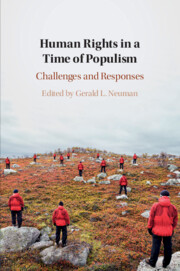Book contents
- Human Rights in a Time of Populism
- Human Rights in a Time of Populism
- Copyright page
- Contents
- Contributors
- Preface
- Acknowledgments
- 1 Populist Threats to the International Human Rights System
- 2 US Human Rights Policy and the Trump Administration
- 3 Rule-of-Law Rights and Populist Impatience
- 4 Populism and Human Rights in Poland
- 5 The Legal Architecture of Populism
- 6 Representation, Paternalism, and Exclusion
- 7 Penal Populism in Emerging Markets
- 8 The Populist Threat to Democracy in Myanmar
- 9 In Defense of Democratic Populism
- 10 Populism and International Human Rights Law Institutions
- 11 Human Rights Responses to the Populist Challenge
- Index
- References
9 - In Defense of Democratic Populism
Published online by Cambridge University Press: 22 April 2020
- Human Rights in a Time of Populism
- Human Rights in a Time of Populism
- Copyright page
- Contents
- Contributors
- Preface
- Acknowledgments
- 1 Populist Threats to the International Human Rights System
- 2 US Human Rights Policy and the Trump Administration
- 3 Rule-of-Law Rights and Populist Impatience
- 4 Populism and Human Rights in Poland
- 5 The Legal Architecture of Populism
- 6 Representation, Paternalism, and Exclusion
- 7 Penal Populism in Emerging Markets
- 8 The Populist Threat to Democracy in Myanmar
- 9 In Defense of Democratic Populism
- 10 Populism and International Human Rights Law Institutions
- 11 Human Rights Responses to the Populist Challenge
- Index
- References
Summary
This chapter questions the proposition that populism is antithetical to human rights. In a constitutional democracy with checks and balances, populism is a form of popular mobilization on moral grounds, and provides an arena for doing something to counter status quo bias. There may indeed be dangers from authoritarian populists, perhaps better described as authoritarians masquerading as populists. But it is necessary to distinguish between liberal and illiberal populists, or inclusive and exclusive populism. Populism offers lessons that the human rights community should learn, including the importance of social movements, the need for clear narrative that encompasses both majorities and minorities, and the use of emotion as the language of values.
Keywords
- Type
- Chapter
- Information
- Human Rights in a Time of PopulismChallenges and Responses, pp. 192 - 217Publisher: Cambridge University PressPrint publication year: 2020
References
- 5
- Cited by



